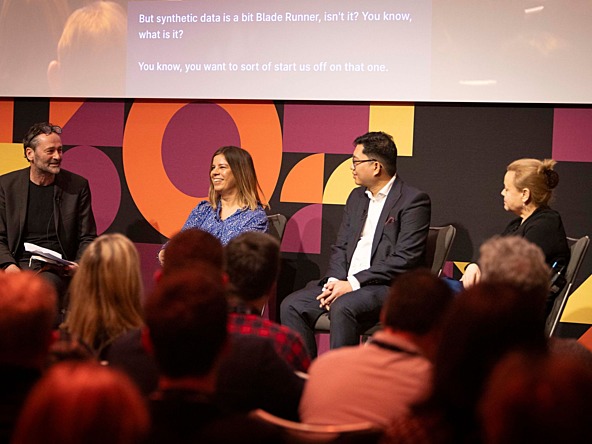Research sector embraces opportunities of synthetic data

Last year, Mark Ritson wrote in Marketing Week that ‘the market research industry is already responding to the suggestion of synthetic data with all the grace and humility of their cigar chomping forebears from the 19th century American railroad industry.’ Ritson’s view was referenced twice during the session; it was an accusation that evidently still rankled.
Researchers have long used forms of synthetic data in their modelling and analysis, so, asked the chair and head of behavioural science at Ipsos Colin Strong, were new opportunities to incorporate synthetic data into research as touted by Ritson just an evolution of existing practice, or a ‘step change’ for the sector?
“It’s more about us being able to fill the gaps in insight about the customers we want to serve,” said Patrick Alcantara, head of insight at Axa: “It’s not something that’s completely alien to us we do it all the time as market researchers. It’s an extension of things that we do.”
For Rose Tomlins, head of brand and customer insight at Virgin Money, the potential could be transformational: “We’ve started to look at opportunities where we haven’t got the customer present in decision-making, but we’d love them to be, and we’d love to involve them earlier.”
By interrogating synthetic data early on, said Tomlins, “you could decide whether to progress before you get to the research planning stage and sharpen your investment”.
Similarly, said Alcantara, in the case of understanding vulnerable customers, a first pass approach would enable him to “ask what are the things I should watch out for, and help me ask more intelligent questions, so that the data I get out of [vulnerable participants] is much better quality, much more actionable, would be able to help me move the dial in terms of what a good customer outcome is.”
Keeping synthetic data up to date is a challenge however, as it needs to reflect changes in real world events and influences.
“One of the use cases I’ve seen that has the most momentum behind it internally is living personas because that’s something built from real research and validated,” said Tomlins. Synthetic personas enable the business to ask “those interrogative slightly dull tiring questions that you need an answer for due diligence”.
Tomlins added: “But there is an implicit responsibility there that the living personas need to be kept fresh – they need actual research so they don’t go out to date.”
Debrah Harding, managing director at MRS, said: “In order to be able to create synthetic data you still need really really good human data.”
Many times, she said, she has seen new technology being touted as the death of the survey or qualitative research.
“I don’t see synthetic data replacing any of those techniques. I think the mix will be different and the way the research is undertaken will be different. But the need for people and the need to continue to protect participants will continue to be an important part of research going forward.”
Legal and ethical use of personal data is just as imperative as ever, said Harding. “If we lose that part of the equation, we’re ruining a lot more than synthetic data collection. We’re ruining research in general.”
Clients need these assurances up front from their suppliers, and the panel agreed that this would be a key differentiator between agencies.
“As someone who is buying research and synthetic data, I put much greater trust in an organisation that can vouch for the integrity of both forms of data, and that knows how to challenge and question it, and can story tell and present it back to me in a holistic way,” said Tomlins.
Synthetic data is fundamentally a human product, said Alcantara. “We need to start interrogating how we produce that data in the first place, and make sure that when we use it we’re doing so in a way that does not propagate our biases or existing prejudices,” he said.
Alcantara reiterated that for an agency to stand out as a preferred supplier they need to: be upfront about their methodology; audit the algorithms used to make sure they don’t carry bias or prejudice; and train the system with diverse data sets.
“For me, those are fundamental things that, as a client, I will be asking the people providing these solutions – if you can answer these questions it will give me assurance that synthetic data is another tool in the toolkit.”
The MRS Delphi Group will be publishing a report on synthetic data use as part of its series on generative AI.

We hope you enjoyed this article.
Research Live is published by MRS.
The Market Research Society (MRS) exists to promote and protect the research sector, showcasing how research delivers impact for businesses and government.
Members of MRS enjoy many benefits including tailoured policy guidance, discounts on training and conferences, and access to member-only content.
For example, there's an archive of winning case studies from over a decade of MRS Awards.
Find out more about the benefits of joining MRS here.














1 Comment
A marketer
2 years ago
Hopefully this will speed up market research and lower the price. This industry is so risk averse - as guardians of personal data I guess it has to be - but sometimes I despair at the clunky and sometimes worthy attitude and the lack of fast insight when I need it, not when they can deliver it
Like Reply Report